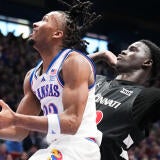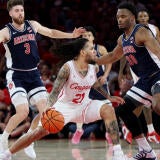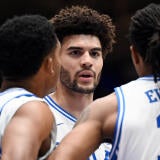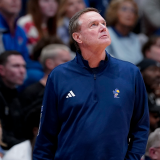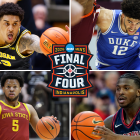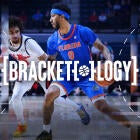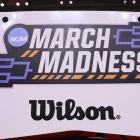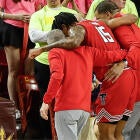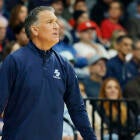2021 college basketball coaching carousel grades: Chris Beard to Texas an A+, UNC gets B+ for Hubert Davis
Grading the major hires of the 2021 college basketball coaching carousel

The college basketball coaching carousel accelerated dramatically in 2021 after a slow turn in 2020 amid the onset of the COVID-19 pandemic. While some suspected schools would again be slow to fire coaches this offseason, any trepidation quickly faded as several major programs made changes and a few big-name coaches retired.
Among the most notable schools entering the fray were Arizona, Indiana, Texas and North Carolina in a cycle that saw coaches from a variety of backgrounds get new opportunities. Just at major schools alone, there were promotions from within, hirings of first-time head coaches, hirings of NBA coaches and poaches from other programs.
Between the coaching carousel chaos and all the activity on the transfer portal, college basketball's offseason news cycle seemed busier than ever this spring and into the summer. Now that things have slowed down in the college basketball world, let's reflect on which schools fared best in their coaching searches.
Earlier we looked at the coaching hires from four years ago, grading them out after a full recruiting cycle and last week we looked at the top first-year hires from the 2020-21 season so here are the grades and explanations for the top hires of the 2021 cycle.
| Team | Coach | Grade | Breakdown |
|---|---|---|---|
| Chris Beard | A+ | Beard can flat-out coach, and as Texas fans have already learned, he can flat out recruit as well. Those attributes make him the no-doubt top hire of the 2021 carousel and should carry the Longhorns to their first NCAA Tournament victory since 2014 in his first season. It took Beard just three seasons to build a Final Four team at Texas Tech, and given his early trajectory at Texas, that seems like a fair over/under mark for how long it will take the Longhorns to reach that destination on his watch. | |
| Wes Miller | A | Cincinnati is lucky to have landed an upgrade in Miller after its cringeworthy parting with John Brannen after just two seasons. Miller was regarded as a serious candidate for the North Carolina opening, and deservedly so after turning the UNC Greensboro program around and leading it to five consecutive 20-win seasons. The two-time Southern Conference coach of the year is a great candidate to carry on the legacy of Bob Huggins and Mick Cronin, both of whom enjoyed extended runs of success with the Bearcats before jumping to even bigger gigs. | |
| Craig Smith | A | Simply put, Smith is a winner. In 2014, he inherited a South Dakota program coming off three straight losing seasons and guided it to four consecutive winning seasons, capped by a 26-9 campaign in 2017-18. Then, he took over a Utah State program that had posted three straight losing seasons in Mountain West play and led it to a 40-13 conference mark in three seasons. The fact that he is already familiar with Utah only made Smith more attractive for the Utes, who have not been to the NCAA Tournament since 2016. | |
| Earl Grant | A | Considering that Boston College hasn't been to the NCAA Tournament since 2009, it should feel good about landing a proven program builder in Grant, who turned things around at College of Charleston. The former Wichita State and Clemson assistant guided the Cougars to three consecutive 20-win seasons from 2017-2019 to highlight his seven-year tenure. Although they cycled down a bit the last two seasons, Grant's squads still maintained winning records in CAA play. BC has been humbled since the ill-advised firing of Al Skinner after the 2009-10 season, and it couldn't have done much better than Grant in this search. | |
| Porter Moser | A | The architect of Loyola Chicago's basketball renaissance finally took the plunge and bit on a major offer by agreeing to replace Lon Kruger at Oklahoma after leading the Ramblers to a 99-36 record over the past four seasons. We'll see how he fares without Sister Jean, but if given enough time, he should prove to be an excellent hire. In the short term, the Sooners are replacing their top-three scorers, which could make Year One of power conference basketball a tough one for Moser. | |
| Tony Stubblefield | A- | Despite Stubblefield's obvious lack of head coaching experience on his resume, DePaul gets an A- for this hire because of who he's worked for over the past two decades. Stubblefield was under a College Basketball Hall of Famer in Lou Henson at New Mexico State from 2000 to 2005. Then he was with Mick Cronin at Cincinnati from 2006 to 2010 before joining Dana Altman at Oregon for the past 11 seasons. DePaul is a program facing a long road to relevance, and the transfer-heavy blueprint used by Altman and Stubblefield at Oregon should have a decent shot at translating in the Big East. | |
| Mike Woodson | A- | Indiana went the Michigan route and hired a beloved former star with a long NBA resume who has been out of the college game for a long time. Woodson never made an All-Star Game or won a title as a player like Juwan Howard, but he has been the coach of two NBA franchises, which makes him far more experienced as a coach than Howard was upon taking the Michigan job in 2019. The hire felt like a reach in the moment, but Woodson already pulled off a coup by convincing Trayce Jackson-Davis to return for a third season. If that's a sign of Woodson's ability to connect with college players, don't be surprised if he guides Indiana to the NCAA Tournament in his first year. | |
| Tommy Lloyd | B+ | Arizona's coaching hot board included several names of former players who are coaching at various levels of college and NBA basketball. But the Wildcats went outside the 'Zona family to hire Lloyd, who spent the last 20 years under Mark Few at Gonzaga. Lloyd's reputation as a great evaluator and recruiter of international talent and his role in the construction of a powerful program make him a worthy choice. But there's no guarantee that Lloyd's proximity to Few over the past two decades means he is destined for greatness as a head coach. | |
| Hubert Davis | B+ | You might think a program of North Carolina's status would be dripping with A+ caliber coaching candidates among its ranks of former players and former assistants. But with Davis and Miller quickly rising to the top of the search after Roy Williams' retirement, it was a reminder that the Tar Heels' coaching tree remains fairly modest. Unlike when Dean Smith retired and Williams was on a run of success at Kansas, there was no elite option with obvious UNC ties to try and lure back this time. Instead, the program is going with continuity and showing loyalty to a former player and longtime assistant in Davis, who is a quality, though somewhat understated, hire for such an elite job. | |
| Shaka Smart | B+ | Should we be giving Marquette the grade for hiring Smart, or should we be giving Smart the grade for jumping ship at Texas for a job with less pressure and comparable capacity for success? If it's the ladder, Smart deserves an A for preserving his sanity and landing a gig that returns him to his Wisconsin roots before he was run out of Texas. From the Marquette side, the hope is that Smart can recapture the incredible success he enjoyed at VCU from 2009 to 2015, because otherwise they just hired a coach with a remarkably similar record to Steve Wojciechowski. Smart won 55.9% of his games at Texas, including 47.7% of his league contests. By contrast, Wojciechowski won 57.4% of his games at Marquette and 46.5% of his league games. We'll see how it shakes out, but Smart looks like a clear winner here. | |
| T.J. Otzelberger | B | This hire would have a better grade if not for Otzelberger's 29-30 record at UNLV over the past two seasons. That unspectacular mark raises questions about how much of his success at South Dakota State was the result of true coaching acumen and how much of it was merely continuation of predecessor Scott Nagy's strong program. Nonetheless, Otzelberger's 70-33 record and pair of NCAA Tournament appearances with the Jackrabbits from 2017 to 2019 and his eight prior seasons as an assistant under three head coaches at Iowa State make him a quality choice for a program that just finished winless in Big 12 play. | |
| Micah Shrewsberry | B | Shrewsberry's resume is solid as they come for a longtime assistant. He went to back-to-back Final Fours with Butler under Brad Stevens, was part of several NBA playoff runs with Stevens in Boston and has worked twice for Matt Painter at Purdue. His combination of NBA and high-level college experience working for two excellent coaches absolutely made him worth a look for a head coaching job. Coaching in the Big Ten when your only prior head coaching experience is at the NAIA level is a tall order, but Penn State's lack of basketball history should mean that Shrewsberry gets a decently long runway. | |
| Mark Adams | B- | The promotion of Adams, 65, from Beard's staff feels like a high-floor, low-ceiling move designed to capture continuity from an electric few seasons for the Red Raiders. Adams is a Texas Tech graduate who played a key role in the the program's recent run of success, but while he's been successful as a head coach at lower levels, it's been almost 25 years since he was last a Division 1 head coach. His retention of Terrence Shannon Jr., Kevin McCullar and Marcus Santos-Silva along with the recruitment of a nice transfer class should keep Texas Tech competitive in the Big 12 for the time being. | |
| Ben Johnson | C | Would Johnson have been hired at Minnesota if he wasn't a Minneapolis native who played for the Gophers from 2002 to 2004? The bet here is no. While there is nothing wrong with hiring a coach who has ties to the program -- see favorable grades given out for Woodson and Davis above -- this one feels like a stretch. The last NCAA Tournament victory Johnson was part of came in 2010 when he was on staff at Northern Iowa. Since then, he was part of unremarkable staffs at Nebraska, Minnesota and Xavier, and it's unclear how any of those stints equipped him to thrive as a first-time head coach in what is widely regarded as the nation's toughest conference. |
















